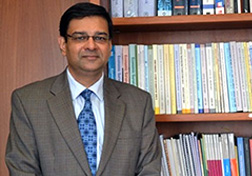
NEW DELHI - Welcoming the appointment of RBI Deputy Governor Urjit R. Patel as the next Governor of the central bank, the government on Monday said that he should be able to contain inflation within the target of 4 per cent, plus or minus two percentage points. “His (Patel) appointment is the right decision and is in the interest of the country. Considering he has good experience in monetary policies and other areas,

he should be able to contain inflation as per the amendments in the RBI Act,” Minister of State for Finance Arjun Ram Meghwal told reporters.
“He has to maintain a balance in growth and monetary policy, hope he will be successful in controlling inflation,” Meghwal said.
Economic Affairs Secretary Shaktikanta Das also welcomed the appointment of Patel as the 24th RBI Governor saying, “With his background in monetary economics, policies and other fields, I am sure he will rise up to the occasion and keep in mind the monetary policy and the inflation target that has now been laid out in the RBI Act.” “....he will also balance the requirement of growth which is mandatory according to the amendments in the RBI Act,” he added.
Patel is said to have been particularly picked for his expertise in inflation-control, which has become the main task of the central bank, ever since the government, under statute, set it a target of 4 percent, plus or minus two percentage points, based on the consumer price index.
Das also said that the job of the RBI Governor is not only constrained to the monetary policy as he is also the regulator of banks and NBFCs (non-banking financial companies). “In that role he has to ensure the functioning of the entire financial system and also look into the flow of credit to all sectors of economy, in particular the requirements of agriculture and MSME (Micro, Small and Medium Enterprise) sector,” Das said. The government on August 20 had named Patel the next Governor of the Reserve Bank of India (RBI) to succeed Raghuram R. Rajan, whose three-year term comes to an end on September 3.
Patel, 52, a Deputy Governor since January 2013 and on a further three-year term since January this year, will take over as chief of India's central bank on September 4. Patel -- who is a Ph.D in economics from Yale and M.Phil from Oxford - has had a mix of stints with multilateral institutions, bureaucracy, central bank, global consultancies and even private companies. He has previously served the International Monetary Fund (IMF) in the US, India, Bahamas and Myanmar.
He was also a consultant in India's Finance Ministry, in the Department of Economic Affairs, and an advisor at The Boston Consulting Group. This apart, he has been a non-resident Senior Fellow of The Brookings Institution.
Patel worked closely with several central and state government committees -- especially those on direct taxes, market studies, anti-trust laws, Prime Minister's Task Force on Infrastructure and sectors like telecom, aviation, power and pensions.
“He has to maintain a balance in growth and monetary policy, hope he will be successful in controlling inflation,” Meghwal said.
Economic Affairs Secretary Shaktikanta Das also welcomed the appointment of Patel as the 24th RBI Governor saying, “With his background in monetary economics, policies and other fields, I am sure he will rise up to the occasion and keep in mind the monetary policy and the inflation target that has now been laid out in the RBI Act.” “....he will also balance the requirement of growth which is mandatory according to the amendments in the RBI Act,” he added.
Patel is said to have been particularly picked for his expertise in inflation-control, which has become the main task of the central bank, ever since the government, under statute, set it a target of 4 percent, plus or minus two percentage points, based on the consumer price index.
Das also said that the job of the RBI Governor is not only constrained to the monetary policy as he is also the regulator of banks and NBFCs (non-banking financial companies). “In that role he has to ensure the functioning of the entire financial system and also look into the flow of credit to all sectors of economy, in particular the requirements of agriculture and MSME (Micro, Small and Medium Enterprise) sector,” Das said. The government on August 20 had named Patel the next Governor of the Reserve Bank of India (RBI) to succeed Raghuram R. Rajan, whose three-year term comes to an end on September 3.
Patel, 52, a Deputy Governor since January 2013 and on a further three-year term since January this year, will take over as chief of India's central bank on September 4. Patel -- who is a Ph.D in economics from Yale and M.Phil from Oxford - has had a mix of stints with multilateral institutions, bureaucracy, central bank, global consultancies and even private companies. He has previously served the International Monetary Fund (IMF) in the US, India, Bahamas and Myanmar.
He was also a consultant in India's Finance Ministry, in the Department of Economic Affairs, and an advisor at The Boston Consulting Group. This apart, he has been a non-resident Senior Fellow of The Brookings Institution.
Patel worked closely with several central and state government committees -- especially those on direct taxes, market studies, anti-trust laws, Prime Minister's Task Force on Infrastructure and sectors like telecom, aviation, power and pensions.

 RSS Feed
RSS Feed
